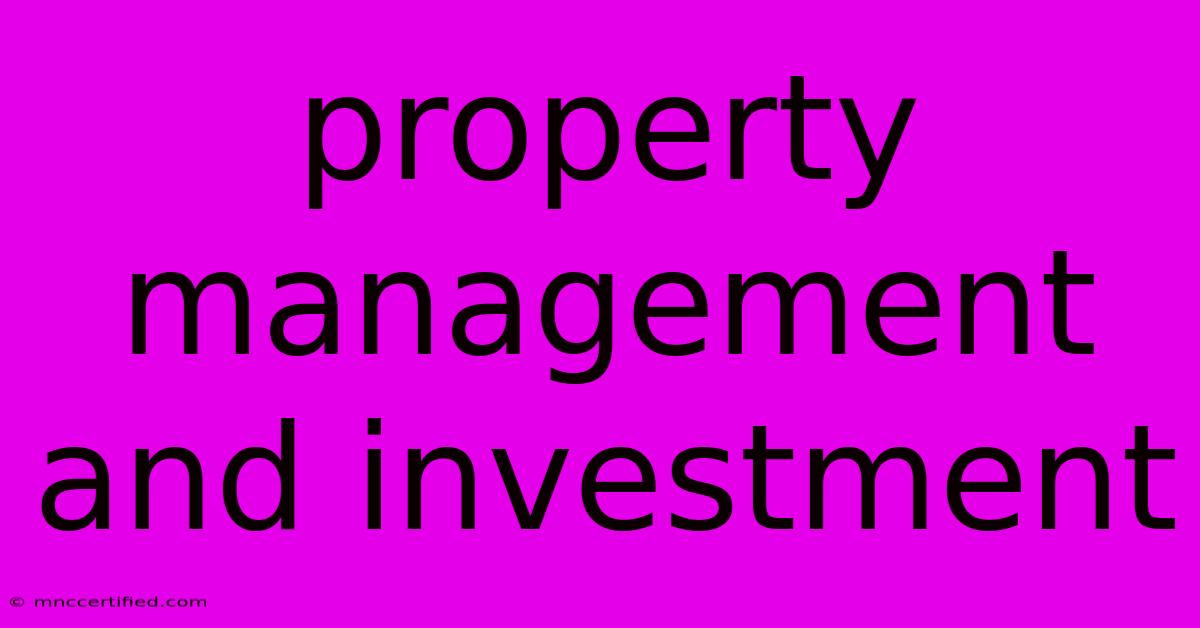Property Management And Investment

Table of Contents
Property Management and Investment: A Guide to Success
Property investment can be a lucrative venture, but it requires careful planning and diligent management. This comprehensive guide explores the crucial aspects of property management and investment, helping you navigate the complexities and maximize your returns. We'll delve into everything from finding the right property to effective tenant management and understanding the financial implications.
Finding the Right Investment Property
The foundation of successful property investment lies in selecting the right property. This involves meticulous research and consideration of several key factors:
Location, Location, Location:
This age-old adage remains paramount. Consider factors like:
- Rental demand: Is there a high demand for rental properties in the area? Research occupancy rates and rental prices.
- Property values: Are property values appreciating in the area? This is crucial for long-term growth and potential resale value.
- Amenities and infrastructure: Proximity to schools, hospitals, transportation, and other amenities significantly impacts rental appeal and property value.
- Crime rates: A safe neighborhood is essential for attracting and retaining quality tenants.
Property Type and Condition:
Choosing the right type of property depends on your investment goals and risk tolerance. Consider:
- Single-family homes: Offer potential for appreciation and strong rental income.
- Multi-family units: Provide higher rental income but require more management.
- Commercial properties: Can generate significant income but involve higher risk and complexity.
Thoroughly inspect the property's condition. Necessary repairs and renovations will impact your initial investment and ongoing expenses. Look for properties with good potential for appreciation.
Effective Property Management Strategies
Managing your investment property effectively is vital for maximizing returns and minimizing headaches. This includes:
Tenant Selection:
- Thorough screening: Conduct background checks, credit checks, and verify employment and rental history. This minimizes the risk of problematic tenants.
- Clear lease agreements: A well-drafted lease agreement protects both you and your tenant. It should clearly outline responsibilities, payment terms, and other important conditions.
Maintenance and Repairs:
- Regular inspections: Conduct regular inspections to identify and address potential issues promptly. This prevents small problems from escalating into costly repairs.
- Reliable contractors: Establish relationships with trustworthy and reliable contractors for repairs and maintenance.
- Emergency response: Have a plan in place to handle emergencies, such as plumbing leaks or heating failures, efficiently.
Financial Management:
- Accurate record-keeping: Maintain detailed records of all income and expenses. This is crucial for tax purposes and financial planning.
- Budgeting and forecasting: Develop a realistic budget that accounts for all expenses, including mortgage payments, taxes, insurance, maintenance, and vacancy rates.
- Tax optimization: Understand the tax implications of property investment and take advantage of available deductions.
Understanding the Financial Landscape
Property investment involves significant financial considerations. You should understand:
- Mortgage financing: Explore different mortgage options and choose the one that best suits your financial situation.
- Property taxes and insurance: Factor these ongoing expenses into your budget.
- Return on investment (ROI): Calculate your ROI to assess the profitability of your investment. Consider factors like rental income, expenses, and potential appreciation.
- Cash flow: Positive cash flow is essential for a successful investment. Ensure your rental income exceeds your expenses.
Leveraging Technology for Property Management
Technology plays a significant role in modern property management. Tools like:
- Property management software: Automates tasks such as rent collection, tenant communication, and maintenance requests.
- Online tenant portals: Provide a convenient way for tenants to pay rent, submit maintenance requests, and communicate with you.
- Virtual tours and online listings: Attract more potential tenants and streamline the leasing process.
Conclusion: Building a Successful Property Portfolio
Successful property management and investment require careful planning, diligent execution, and a proactive approach. By focusing on finding the right properties, implementing effective management strategies, and understanding the financial implications, you can build a profitable and rewarding investment portfolio. Remember that continuous learning and adaptation are key to long-term success in this dynamic market. Consider consulting with real estate professionals and financial advisors to guide your investment decisions.

Thank you for visiting our website wich cover about Property Management And Investment. We hope the information provided has been useful to you. Feel free to contact us if you have any questions or need further assistance. See you next time and dont miss to bookmark.
Featured Posts
-
Karoline Leavitt Next Trump Spokesperson
Nov 17, 2024
-
Fox Sets Kings Scoring Record 60
Nov 17, 2024
-
Does Solar Increase Home Insurance
Nov 17, 2024
-
Peter Dinklage Disneyland Accident Hoax
Nov 17, 2024
-
El Potrero Trading Post Chimayo Nm
Nov 17, 2024